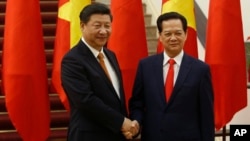Vietnamese Communist Party chief Nguyen Phu Trong has asked visiting Chinese President Xi Jinping “not to militarize" and to "maintain peace” in the South China Sea, according to a statement published on Vietnam’s government website.
Trong held talks with Xi shortly after the Chinese leader arrived Thursday in Hanoi for a two-day visit aimed at repairing the relations damaged by Beijing’s assertive moves in disputed waters claimed by China, Vietnam and other countries.
The two sides are “committed to managing and solving maritime disputes so as not to impact on healthy and stable development of mutual ties,” the statement said.
Meanwhile, China’s state news agency, Xinhua, quoted Xi’s written statement as saying he hoped his visit “could help lift China-Vietnam comprehensive strategic cooperative partnership to a new level."
Maritime confrontations
Anti-China sentiments are running high in Vietnam, a year after Beijing placed a controversial oil rig in disputed waters, leading to several small maritime confrontations and deadly rioting in mainland Vietnam.
Hours before Xi arrived in Hanoi, dozens of protesters took to the streets in the capital, and activists in southern Ho Chi Minh City also joined forces. But unlike the demonstrators in rallies a day before, the protesters were quickly dispersed.
Videos posted online show scuffles between protesters and security forces in Ho Chi Minh City, formerly known as Saigon. One person with a bloodied face is heard shouting: “This is the bloodstain of Xi Jinping! I was beaten up because of Xi Jinping.”
Peter Lam Bui, a witness, told VOA that dozens of people had gathered earlier to oppose Xi’s visit, blaming him for taking away Vietnamese islands.
“They [security forces] assaulted us a few minutes after we had rallied," he said. "Many people were hit hard, to the point that they fainted and fell on the ground. One protester was hit in the face and has been hospitalized since then.”
Ho Chi Minh City police could not be reached for comment.
According to activists, security around Chinese diplomatic missions in Hanoi and Ho Chi Minh City was beefed up, so they could not get near them.
Xi is scheduled to deliver a speech to Vietnam’s legislature Friday, the first time in a decade that a foreign head of state has been given this honor.
Lawmaker Vu Xuan Hong said it is a significant event and he expects Xi to outline how to further the ties between the two nations.
“The leader of a big country like China comes to talk to us, so there must be very important messages about the mutual ties," Hong said. "I think the South China Sea issue is one of the topics that President Xi would bring up [in his speech].”
Call for boycott
Civil society groups have called for Vietnamese lawmakers to boycott the speech to show Vietnam’s dissatisfaction with China’s activities in the South China Sea.
But Tung X. Bui, director of the APEC Study Center at the University of Hawaii, said he believes it is in Vietnam’s best interest to be on good terms with China.
“But there is another reality that we should not forget," he said. "China and Vietnam are still neighboring countries. Like it or not, I don’t think anyone can ignore the fact that there are strong economic and political ties between the two neighbors.”
But Cu Huy Ha Vu, a former Vietnamese political prisoner and scholar at Northwestern University School of Law, believes Xi's visit is aimed at exerting influence on Vietnam before expected leadership changes early next year in the Vietnamese Communist Party's 12th party congress.
“Xi Jinping must make sure that the new leadership after the 12th Congress of the Vietnamese Communist Party will always be loyal to China,” he said.
In addition to Vietnam, China also has competing South China Sea claims with Brunei, Malaysia, Indonesia and the Philippines.
Chu Wu also contributed to this report, which was produced in collaboration with the VOA Vietnamese and Mandarin services.








